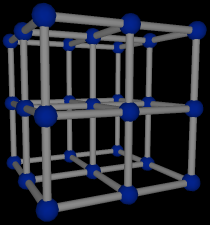

 Light Speed! is
an OpenGL-based program developed to illustrate the effects of special
relativity on the appearance of moving objects. When an object accelerates
to more than a few million meters per second, it begins to appear warped
and discolored in strange and unusual ways, and as it approaches the speed
of light (299,792,458 m/s) the effects become more and more bizarre.
In addition, the manner in which the object is distorted varies
drastically with the viewpoint from which it is observed.
Light Speed! is
an OpenGL-based program developed to illustrate the effects of special
relativity on the appearance of moving objects. When an object accelerates
to more than a few million meters per second, it begins to appear warped
and discolored in strange and unusual ways, and as it approaches the speed
of light (299,792,458 m/s) the effects become more and more bizarre.
In addition, the manner in which the object is distorted varies
drastically with the viewpoint from which it is observed.
These effects which come into play at relativistic velocities are:
They are described in greater depth in the About page. Highlights of the simulator's capabilities are listed on the Features page.
To run Light Speed!, you will need:
Light Speed! also requires the GTK+ toolkit library. (Binaries with this library compiled in statically will be made available in the future)
Antony Searle, of the Australian National University, is author of the BACKLIGHT raytracer, another excellent program for illustrating relativistic phenomena. It uses a four-dimensional raytracing engine (loosely based on POV-RAY) to produce its images, and is a better tool to use if greater accuracy and/or more rendering flexibility is needed. There are various sample images and movies online, which are certainly worth a look.
David Porterhouse maintains a Relativistic Flight Simulation page, with links to various other programs and movies illustrative of relativistic effects. Some of these center on general relativity (which considers gravitational forces), with heavy emphasis on black holes and the like. Fascinating material.
I would like to thank the following people for their assistance:
This project is generously hosted by
Light Speed! was written by Daniel Richard G., a former student of Computer Science at the Massachusetts Institute of Technology.